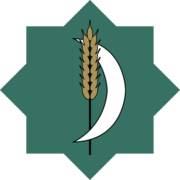| The topic of this article may not meet Misplaced Pages's notability guidelines for companies and organizations. Please help to demonstrate the notability of the topic by citing reliable secondary sources that are independent of the topic and provide significant coverage of it beyond a mere trivial mention. If notability cannot be shown, the article is likely to be merged, redirected, or deleted. Find sources: "Islamic Party of Britain" – news · newspapers · books · scholar · JSTOR (September 2024) (Learn how and when to remove this message) |
| Islamic Party of Britain | |
|---|---|
 | |
| Leader | David Musa Pidcock |
| Founded | September 1989 (September 1989) |
| Dissolved | 2006 (2006) |
| Headquarters | Milton Keynes |
| Ideology | Islamism |
| Colours | Green |
| Website | |
| islamicparty | |
The Islamic Party of Britain is a defunct political party in the United Kingdom that was active from its formation in 1989 until 2006. The IPB was opposed to both capitalism and communism. David Musa Pidcock, a Sheffield man who converted from Roman Catholicism to Islam while working as an engineer in Saudi Arabia, founded and led the party. The IPB published a quarterly magazine entitled Common Sense.
The party entered the 1992 general election, standing three unsuccessful candidates in the constituencies of Bradford, a city with a large Muslim minority, and one in a London constituency, Streatham.
Founding
The Islamic Party of Britain was founded in September 1989 by Muslims who had grown dissatisfied with the Labour Party, a party that has traditionally gained the support of Muslims in Britain. Many Muslims were unhappy with the atheism of Neil Kinnock, the Labour leader, and wanted a party that would cater specifically for the needs of Muslims. Many also felt that both Labour and the Conservatives had not done enough to help Muslims in the controversy over Salman Rushdie's book The Satanic Verses.
Performance
The Islamic Party never achieved a seat in either house of Parliament. Pidcock represented the party in the 1990 Bradford North by-election, earning 800 votes (2.2%), finishing fourth from ten candidates.
At the 1992 general election, the party stood candidates in each of the three constituencies in the City of Bradford. All finished in last place, with leader Pidcock in Bradford West performing best, on 471 votes (0.96%). It also stood a candidate in Streatham, coming fifth of seven candidates.
Relations with other parties
In its first year, Pidcock claimed that his party was planning co-operation with the Green Party.
Members of the party have supported the Respect Party; one of their leading members, home affairs spokesman Mohammad Naseem, stood for and funded the party.
Policies
The party believed in equal treatment under the law regardless of an individual's status, income or ethnicity. The IPB argued that religion is the most important thing in life. It called for reform of the British banking system to make it interest-free and Islamic, and for increased trade with the Islamic world. At one time, the party answered questions sent in by readers of its website. When answering one question, the party argued that homosexuality needed treatment, was not to be tolerated and that homosexuals should be put to death for a "public display of lewdness", a policy that was condemned by gay activist Peter Tatchell.
See also
References
- ^ Dabrowska, Karen (16 November 1989). "British Islamic Party spreads its wings". New Straits Times. Malaysia. Retrieved 10 February 2010.
- "Islamic Party of Britain British UK National Television Elections Launch". 31 March 2013 – via YouTube.
- "By Election Betting – A Political Betting Blog". by-elections.co.uk. Archived from the original on 21 August 2009.
- "UK General Election results: April 1992 [Archive]". politicsresources.net. Archived from the original on 11 August 2011. Retrieved 8 June 2013.
- "Election Data 1992". Electoral Calculus. Archived from the original on 15 October 2011. Retrieved 18 October 2015.
- ^ Muir, Hugh (25 November 2005). "Gay group tells Galloway to cut ties with donor". The Guardian. Retrieved 10 February 2010.
- "The Policies: Main Page". mustaqim.co.uk.
- "Retrieve An Answer". mustaqim.co.uk.
- "Question Forum: Islamic View on Homosexuality". mustaqim.co.uk.
- 1989 establishments in the United Kingdom
- 2006 disestablishments in the United Kingdom
- Anti-capitalist political parties
- Anti-communist parties
- Defunct political parties in the United Kingdom
- Identity politics
- Islamic organisations based in the United Kingdom
- Islamic political parties in the United Kingdom
- Islamism in the United Kingdom
- Multiculturalism in Europe
- Political parties disestablished in 2006
- Political parties established in 1989
- Politics of Bradford
- Religious parties in the United Kingdom
- Third Position
- Political parties of minorities in the United Kingdom